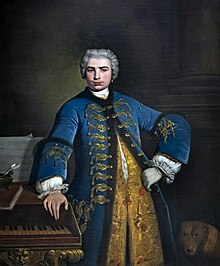 Global Information
Global InformationCastrato information

| Voice type |
|---|
| Female |
|
| Male |
|
A castrato (Italian; pl.: castrati) is a male singer who underwent castration before puberty in order to retain singing voice equivalent to that of a soprano, mezzo-soprano, or contralto. The voice can also occur in one who, due to an endocrinological condition, never reaches sexual maturity.
Castration before puberty (or in its early stages) prevents the larynx from being transformed by the normal physiological events of puberty. As a result, the vocal range of prepubescence (shared by both sexes) is largely retained, and the voice develops into adulthood in a unique way. Prepubescent castration for this purpose diminished greatly in the late 18th century.
Methods of castration used to terminate the onset of puberty varied. Methods involved using opium to medically induce a coma, then submerging the boy into an ice or milk bath where the procedure of either severing the vas deferens (similar to a vasectomy), twisting the testicles until they atrophied, or complete removal via surgical cutting was performed (however the complete removal of the testicles was not a popularly used technique).[1] The procedure was usually done to boys around the age of 8–10; recovery time from the procedure took around two weeks.[2] The means by which future singers were prepared could lead to premature death. To prevent the child from experiencing the intense pain of castration, many were inadvertently administered lethal doses of opium or some other narcotic, or were killed by overlong compression of the carotid artery in the neck (intended to render them unconscious during the castration procedure).[3]
The geographical locations of where these procedures took place is not known specifically. During the 18th century, the music historian Charles Burney was sent from pillar to post in search of places where the operation was carried out:
I enquired throughout Italy at what place boys were chiefly qualified for singing by castration, but could get no certain intelligence. I was told at Milan that it was at Venice; at Venice that it was at Bologna; but at Bologna the fact was denied, and I was referred to Florence; from Florence to Rome, and from Rome I was sent to Naples ... it is said that there are shops in Naples with this inscription: 'QUI SI CASTRANO RAGAZZI' ("Here boys are castrated"); but I was utterly unable to see or hear of any such shops during my residence in that city.[4]
As a castrato's body grew, his lack of testosterone meant that his epiphyses (bone-joints) did not harden in the normal manner. Thus, the limbs of the castrati often grew unusually long, as did their ribs. This, combined with intensive training, gave them unrivaled lung power and breath capacity.[5] Operating through small, child-sized vocal cords, their voices were also extraordinarily flexible, and quite different from the equivalent adult female voice. Their vocal range was higher than that of the uncastrated adult male. Listening to the only surviving recordings of a castrato (see below), one can hear that the lower part of the voice sounds like a "super-high" tenor, with a more falsetto-like upper register above that.
Castrati were rarely referred to as such: in the 18th century, the euphemism musico (pl.: musici) was much more generally used, although it usually carried derogatory implications;[6] another synonym was evirato, literally meaning "emasculated". Eunuch is a more general term since, historically, many eunuchs were castrated after puberty and thus the castration had no effect on their voices.
- ^ Finucci, Valeria (2003). The Manly Masquerade. London: Duke University Press. p. 245.
- ^ Valeria, Funucci (2003). The Manly Masquerade. London. p. 253.
{{cite book}}: CS1 maint: location missing publisher (link) - ^ such procedures are described in D'Ancillon, as translated into English by Samber, R.: Eunuchism Display'd ... (London, 1718), pp. 15–16
- ^ Scholes, P (ed): Dr Burney's Musical Tours in Europe (London, 1959), vol. 1, p. 247
- ^ Lancet The Voice of the Castrato, Archived 11 June 2012 at the Wayback Machine 1998; 351: pp. 1877–80.
- ^ New Grove Dictionary of Opera, vol 3, p. 529, sv "musico"